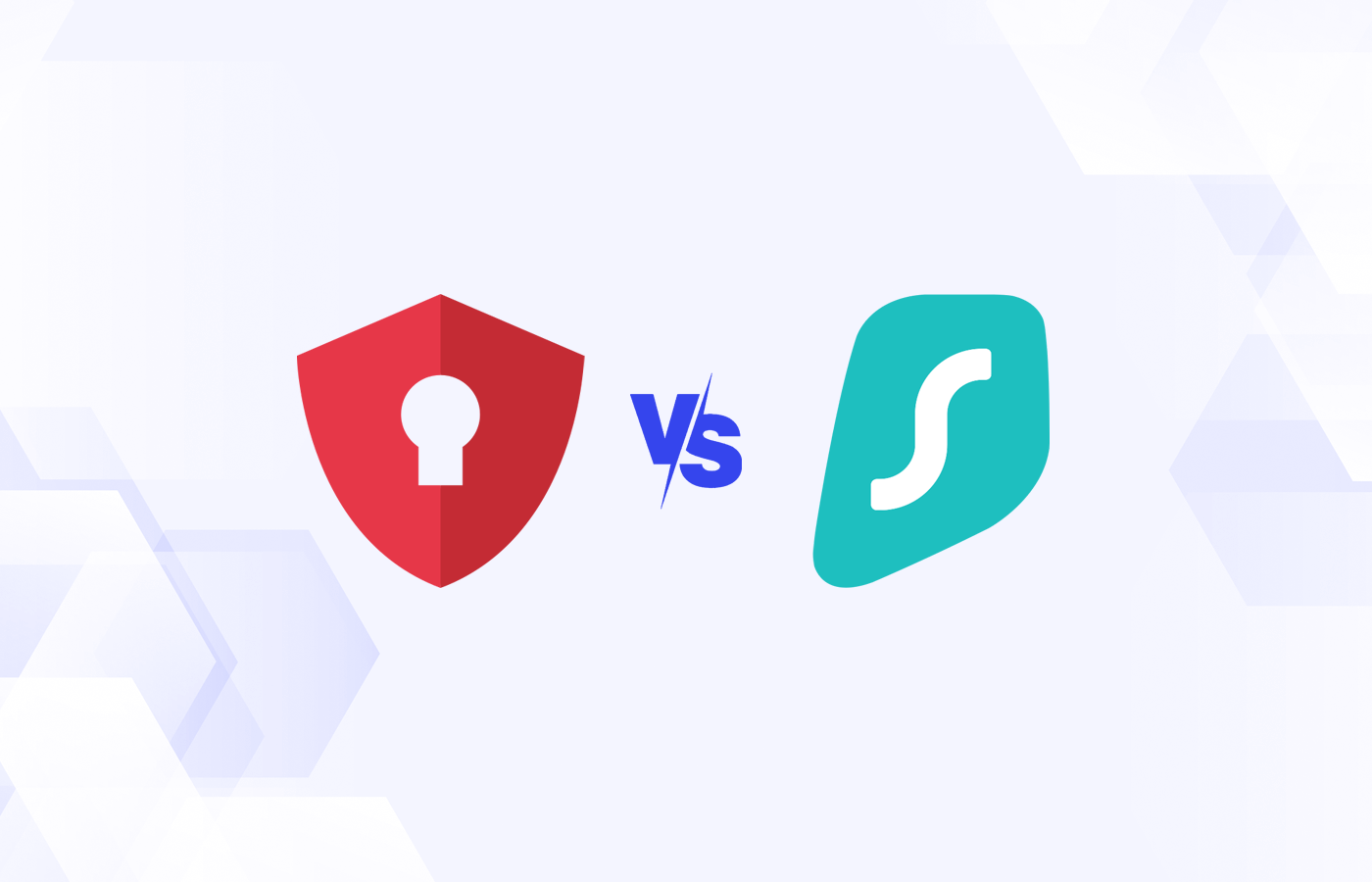Cloud native application protection platforms (CNAPP) give enterprises the tools and functionality they need to protect their cloud applications and workloads from security threats.
Securing cloud-native apps requires an extensive approach that goes well beyond basic security solutions. Cloud native application protection platforms (CNAPP) accomplish that by combining a range of cloud security tools and functions such as cloud workload protection platforms (CWPP), cloud security posture management (CSPM), cloud infrastructure entitlement management (CIEM), Infrastructure-as-Code (IAC) scanning and more to secure cloud workloads, applications, identity and access management, dev environments and more from threats and vulnerabilities.
We’ll take an in-depth look at the top five CNAPP solutions available today, followed by recommendations to help you choose the best CNAPP product for your organization’s needs.
Top CNAPP tools:
- Check Point CloudGuard: Best for container security and runtime protection
- CrowdStrike Falcon Cloud Security: Best for advanced threat protection
- Prisma Cloud by Palo Alto Networks: Best for comprehensive cloud-native application security
- Sysdig Secure: Best for consolidated CDR and CNAPP capabilities
- Wiz: Best for intuitive user interface
Top 5 Cloud Native Application Protection Platforms (CNAPP) Comparison
Here is an overview of the top five cloud native application protection platforms, including their CWPP/CSPM integration, agent or agentless approach, free trial availability and pricing details.
| CWPP/CSPM Integration | Agent/Agentless Approach | Free trial | Pricing | |
|---|---|---|---|---|
| Check Point CloudGuard | Both | Agents and agentless | Available | Price starts at $625 per month for 25 assets |
| CrowdStrike Falcon Cloud Security | Both | Agents and agentless | Available | Price starts at $300 annually for a basic plan |
| Prisma Cloud | Both | Agents and agentless | Available | Starts at $9,000 annually per 100 Business Edition credits |
| Sysdig Secure | Both | Agent and agentless | Available | Starts at $720 annually per standard Sysdig Secure plan. Additional usage costs $0.125/unit. |
| Wiz | CWPP | Agentless | Does not mention a free trial, although a free demo is available. | Wiz has not provided pricing information for this product. |
Jump ahead to:
- Key Features of Cloud Native Application Protection Platforms
- How Do I Choose the Best CNAPP Solution for My Business?
- Frequently Asked Questions (FAQs)
- How We Selected the Top CNAPP Products
- Bottom Line: Cloud Native Application Protection Platforms (CNAPP)

Check Point CloudGuard
Best for container security and runtime protection
Check Point CloudGuard provides greater security capabilities for cloud-native applications through the combination of CWPP and CSPM. It is ideal for enterprises looking for improved container security and runtime protection in their cloud settings. It has a unified dashboard, a policy rule set, and support for both agent and agentless monitoring and protection. Check Point CloudGuard distinguishes itself with its comprehensive container security and runtime protection features, making it a good alternative for enterprises looking to improve the security of their cloud-native applications.
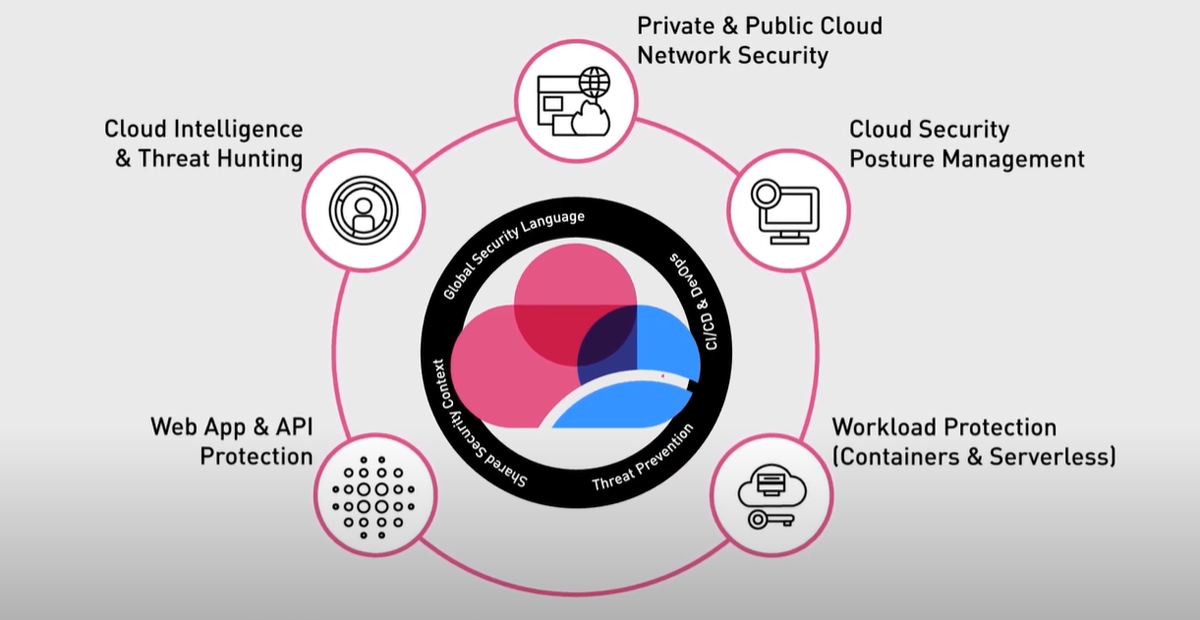
Pricing
- Check Point has not provided pricing information for this service but you may contact Check Point sales for custom quotes
- AWS Marketplace provides some pricing information that starts at $625 per month for 25 assets
Features
- The Infinity unified security platform enables intelligent threat prevention from on-premises to the cloud
- Protects against attacks across major cloud platforms such as AWS, Azure, Google Cloud, Cisco ACI, VMWare NSX, Ali, and Oracle
- Provides unified visualization for all of your cloud traffic, security warnings and assets, as well as auto-remediation
- Provides DevOps with the tools they need to assess security posture, get configuration assistance, alerts, and governance during CI/CD
- Integrates controls into CI/CD technologies, such as CloudFormation and Terraform, allowing pre-deployment security posture evaluation and scaling over hundreds of thousands of cloud assets
- Profiles and defines application behavior automatically, imposing zero trust boundaries across cloud workloads like containers and serverless architectures
- Offers security hardening, runtime code analysis, and Web/API security, with cloud-native multi-layer protection
- Protects against misconfigurations and updates security and compliance best practices, including auto-remediation
- Complies with regulatory and industry standards such as HIPAA, CIS BENCHMARKS, NIST CSF/800-53, and PCI-DSS, and provides High Fidelity Posture Management (HFPM) to ensure contextual cloud security across 300+ native cloud services
Pros
- Comprehensive container security and runtime protection
- Suitable for large-scale businesses that use SaaS as a delivery model
- Integrates with both CWPP and CSPM for increased security
- Offers threat intelligence and proactive protection systems
- Includes compliance and governance components to ensure regulatory compliance
- Integrates well with DevOps procedures for secure development
Cons
- Pricing information is not publicly available
- Some advanced features and add-ons may require additional configuration and setup and add to cost
See the Top Cloud Security Companies

CrowdStrike Falcon Cloud Security
Best for advanced threat protection in cloud environments
CrowdStrike‘s CNAPP capabilities were boosted last year through its CrowdStrike Falcon Cloud Security platform. New features are designed to improve threat hunting in cloud environments, reduce response times, and improve overall security. Falcon Cloud Security includes CWP, CSPM, CIEM and container security in a single CNAPP offering.
CrowdStrike offers a “1-Click XDR” capability that automatically identifies and secures unprotected cloud workloads by instantly deploying the CrowdStrike Falcon agent, in addition to agentless options for cloud application security. The agent-based technology protects both before and during runtime, giving organizations total visibility and repair capabilities. This adversary-focused technique helps organizations secure their cloud infrastructure and applications throughout the CI/CD pipeline.
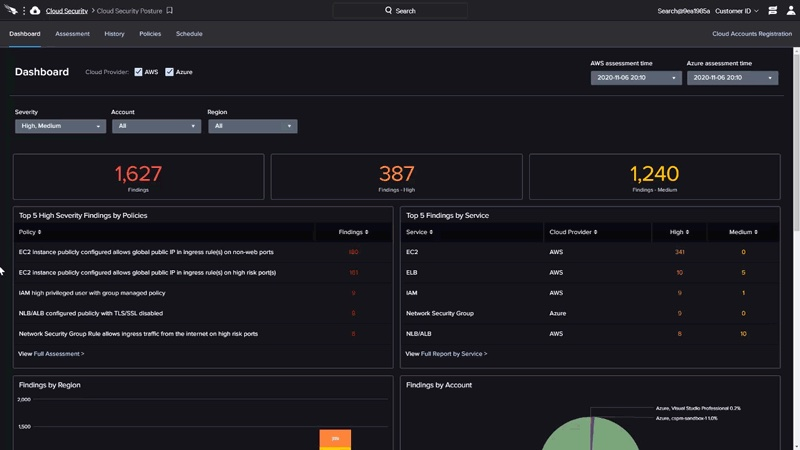
Pricing
- Price starts at $300 annually per basic Falcon Go bundle. AWS offers additional pricing info.
Features
- Streamlines compliance enforcement and delivers multi-cloud visibility, continuous monitoring, and threat detection, allowing DevOps teams to deploy applications more quickly and efficiently
- Provides automatic detection and protection of all workloads with a single click, integrating seamlessly with DevOps to support continuous integration/continuous delivery (CI/CD)
- Provides strong identity-based security, visibility, privileged access management and policy enforcement
- Performs one-click remediation testing before deployment
- Supports containers, Kubernetes and hosts across AWS, Azure, and Google Cloud environments
- Provides for vulnerability discovery from development to production in any cloud
Pros
- Comprehensive cloud security posture management (CSPM) is now integrated along with cloud workload protection
- Requires minimal CPU demand and negligible impact on system performance
- Delivers a comprehensive and accurate picture of the cloud threat landscape
- Real-time visibility and monitoring of cloud workloads
- Employs advanced behavioral analytics and machine learning for effective and proactive threat identification and defense
- Continuously monitors and alerts for unusual activity
Cons
- Some users report that the user account management for insider threat detection could be better
- Some advanced features may require additional configuration and cost

Prisma Cloud
Best for comprehensive cloud-native application security capabilities
Prisma Cloud by Palo Alto Networks’ CNAPP technology offers full security stack protection for cloud settings. The platform’s unified strategy helps security operations and DevOps teams work cohesively and expedite secure cloud-native application development. Prisma Cloud CNAPP distinguishes itself with its enhanced and comprehensive cloud-native application protection features, allowing businesses to easily safeguard containerized and serverless applications. It’s best suited for enterprises looking for strong and proactive cloud-native application protection.

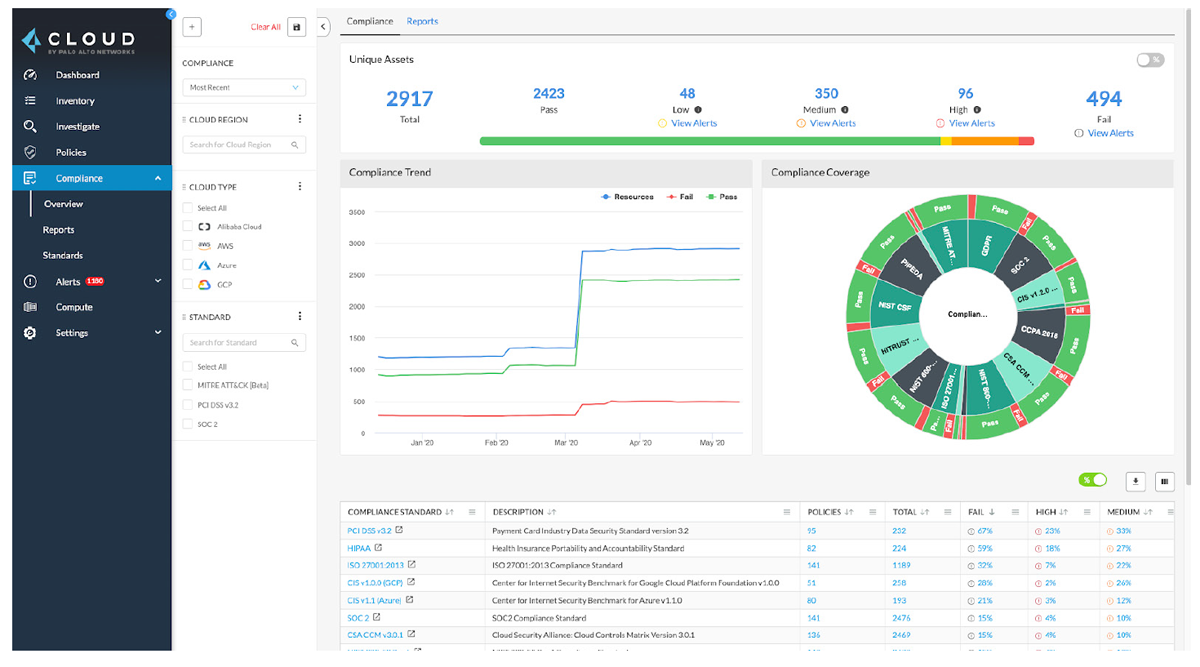
Pricing
- Starts at $9,000 annually per 100 Business Edition credits
- Explore Prisma Cloud by Palo Alto’s pricing guide here or visit AWS marketplace for more pricing information
Features
- Offers full-stack security from code to cloud, covering IaC security, Secrets security, Container image scanning, Software composition analysis (SCA), Supply chain security, and Software bill of materials (SBOM) generation
- Provides visibility, compliance, and governance in its cloud asset inventory, configuration assessment (runtime), and compliance monitoring and reporting
- Automated threat detection through user and entity behavior analytics (UEBA), API-based network traffic visibility, analytics, and anomaly detection and automated investigation and response
- Continuously detects and automatically remediates identity and access risks across infrastructure as a service (IaaS) and platform as a service (PaaS) offerings
- Detects and prevents network anomalies by enforcing container-level microsegmentation, inspecting traffic flow logs, and leveraging advanced cloud-native Layer 7 threat prevention with network visibility and anomaly detection, identity-based microsegmentation, and cloud-native firewalling
- Includes host security, container security, serverless security, and web application and API security
Pros
- Security is readily integrated into the main CI/CD processes, registries, and running stacks
- Across the application lifetime, it provides visibility, control, and automatic solutions for vulnerabilities and misconfigurations incorporated in developer tools
- Vulnerability intelligence from over 30 sources gives quick risk clarity, while controls across the development process keep vulnerable settings from reaching production
- Offers built-in compliance monitoring and reporting features
- Provides advanced threat intelligence and anomaly detection capabilities
Cons
- Data classification, malware scanning, and data governance are available for AWS support only
- Some advanced features may need additional configuration, training, and expertise for deployment
Also read: CNAP Platforms: The Next Evolution of Cloud Security

Sysdig Secure
Best for consolidated CDR and CNAPP capabilities
Sysdig Secure consolidates cloud detection and response (CDR) and cloud-native application protection platforms (CNAPP), employing the open-source Falco in both agent and agentless deployment modes. With this pairing, threats can be identified quickly anywhere in the cloud, with 360-degree visibility and connection across workloads, identities, cloud services, and third-party applications. Sysdig Secure offers a comprehensive set of capabilities such as identity threat detection, incident response, software supply chain detection, increased Drift Control, and live mapping.
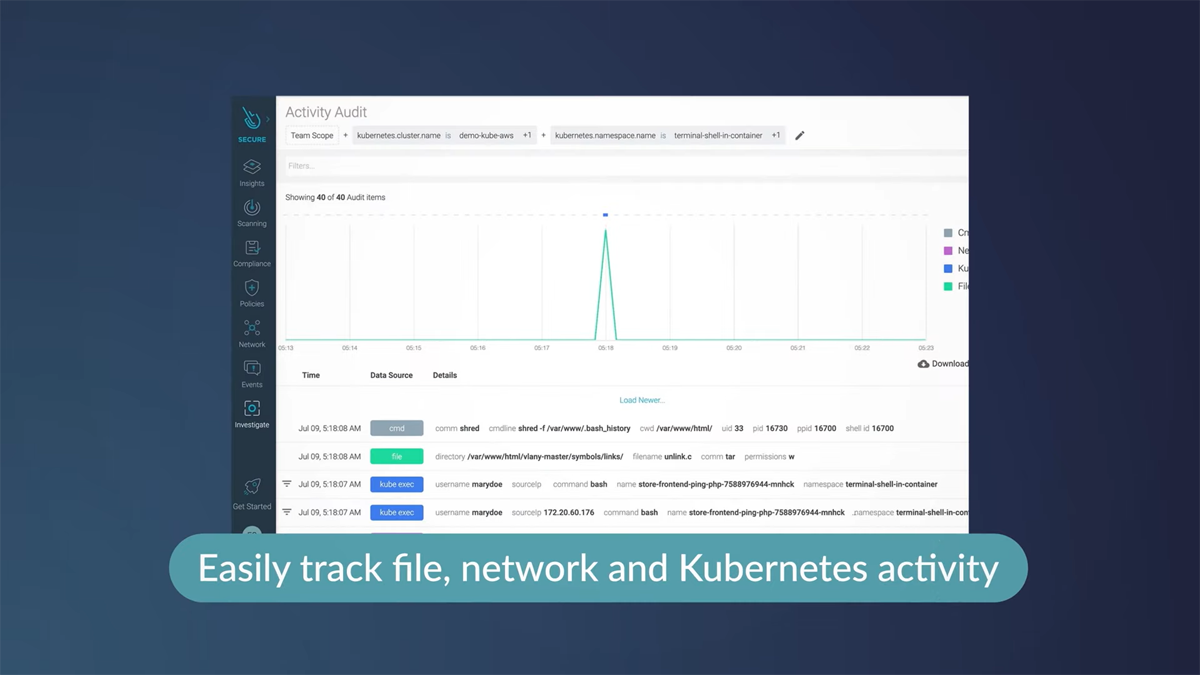
Pricing
- Sysdig provides only custom quotes, but AWS Marketplace provides some pricing information that starts at $720 annually per standard Sysdig Secure plan. Additional usage costs $0.125/unit.
Features
- Agentless Falco deployment for cloud threat detection removes the requirement to deploy Falco on infrastructure
- Sysdig Okta detection safeguards against identity threats by correlating Okta events with cloud and container activities and offering real-time insight
- Sysdig GitHub detections expand threat detection to the software supply chain, alerting developers and security teams to crucial events such as hidden pushes
- Prevents runtime assaults by prohibiting executables that do not originate from the original container
- Kubernetes Live allows teams to dynamically see their infrastructure and workloads, allowing for faster issue response
- Sysdig Process Tree illustrates the attack path from user to process, giving crucial information for recognizing and removing threats
- Provides curated threat dashboards for a unified view of security concerns across clouds, containers, Kubernetes, and hosts, prioritizing risks in real time; mapping against the MITRE framework further adds context to cloud-native settings
Pros
- Drift Control has been improved to avoid runtime assaults
- Kubernetes Live provides real-time incident response with live mapping
- Provides both agent-based and Falco-based advanced agentless cloud threat detection
- Detects identity threats with Sysdig Okta detections
- Detects software supply chain issues with Sysdig GitHub detections
Cons
- Pricing information is only available upon request
- For effective deployment, additional training and expertise may be required
See the Top Container Security Solutions

Wiz
Best for intuitive single user interface
Wiz CNAPP provides a cloud infrastructure security solution that includes CSPM, CWPP, and other capabilities in a single unified platform. It can identify an isolated misconfiguration in a single layer of the cloud environment, and also consolidates information using a graph-based database across multiple layers of the cloud environment to identify where a breach path could be and risk to the environment. Wiz easily integrates with DevOps and provides intelligent automation.
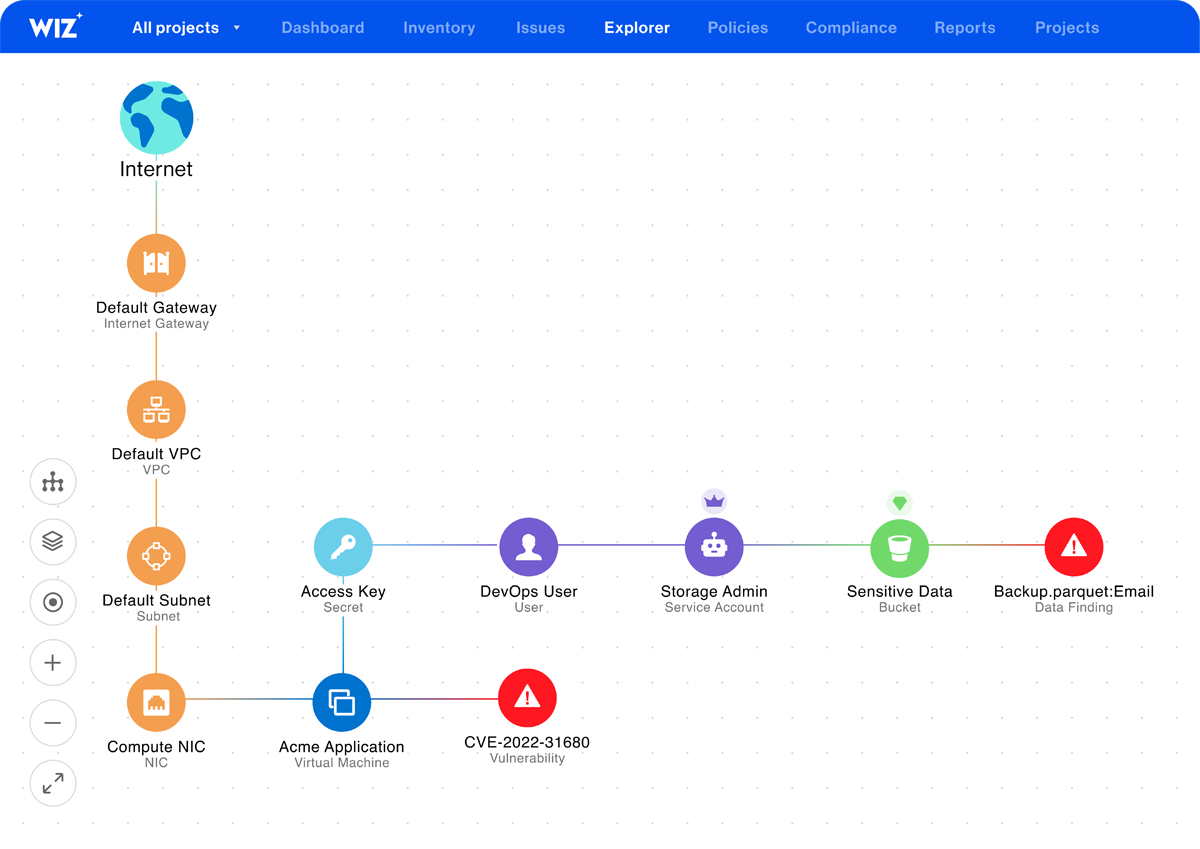
Pricing
- Wiz doesn’t publish pricing information, but you may contact Wiz Sales for plans and quotations. Some Wiz pricing information is available on AWS.
Features
- Scans buckets, data volumes, and databases fast and classifies the data for monitoring
- Performs continuous detection of critical data exposure
- Uses schema matching to identify data flow and lineage
- Automatically assesses compliance on a continuous basis to verify that security rules are continuously implemented
- Provides agentless scanning that can be implemented quickly
Pros
- Agentless and graph-based architecture
- Wiz deployment uses a single cloud role to scan your whole cloud environment, including PaaS, VMs, containers, serverless operations, buckets, data volumes, and databases
- Provides a unified platform, a unified data layer, and a unified policy framework for normalizing data across clouds, architectures, pipelines, and runtimes
- A single risk queue prioritizes what action your teams should take
- Simplifies the workflow of risk reduction
Cons
- Pricing information is only available from Wiz Sales
- Customers have reported some difficulty in contacting the customer success team
- The website does not mention a free trial version, although a free demo is available
Also read:
Key Features of Cloud Native Application Protection Platforms (CNAPP)
Cloud Native Application Protection Platforms (CNAPP) provide a comprehensive set of security capabilities for cloud-native applications. These solutions protect cloud-native environments against evolving threats and ensure the integrity and compliance of applications by providing container security, advanced threat intelligence, DevOps integration, microservices and serverless application security, as well as compliance and governance functionalities.
Container Security and Runtime Protection
Container security protections provided by CNAPP systems should be robust, including vulnerability scanning, security configuration management, and runtime protection. These technologies discover vulnerabilities, enforce safe setups, and provide runtime defensive mechanisms by continually monitoring containers.
Advanced Threat Intelligence Capabilities
CNAPP employs advanced threat intelligence approaches such as machine learning algorithms and behavioral analytics. Because of this proactive strategy, the systems can identify and mitigate complex attacks in real time. CNAPP systems identify possible security problems and take proactive actions to reduce risks by identifying patterns and unusual activity.
DevOps Integration
One of CNAPP systems’ key features should include a seamless integration with DevOps procedures. These systems provide a complete security orchestration architecture that works in tandem with DevOps tools and procedures. CNAPP systems guarantee that security measures are implemented from the beginning of the software development lifecycle, allowing enterprises to construct safe applications without sacrificing development pace.
Microservices and Serverless Application Security
End-to-end security for microservices-based architectures and runtime defense includes traffic encryption, identity and access management, and runtime defense methods. CNAPP technologies also ensure the integrity and confidentiality of serverless environments by defending against function-level vulnerabilities, API misuse, and data disclosure threats.
Compliance and Governance
CNAPP solutions help enterprises maintain a strong security posture and adhere to industry-specific standards by automating compliance checks and providing governance frameworks.
How Do I Choose the Best Cloud Native Application Protection Platforms (CNAPP) for My Business?
Matching your requirements and cloud environment with the best CNAPP product for your needs is the surest way to better cloud security. Here are several guidelines to aid you in your CNAPP product evaluation.
- Determine your requirements. Begin by learning about your organization’s particular needs and security goals. Consider the type of apps you need to protect, the cloud platforms you use, and your regulatory compliance requirements.
- Assess CNAPP product features, such as container security, runtime protection, threat intelligence, and compliance capabilities. Select a platform that meets your requirements.
- Evaluate scalability and performance of CNAPP tools to make sure they can manage the volume and complexity of your applications and minimize performance lags.
- Look for CNAPP products that will integrate well with your current technology stack, which should include your cloud provider, DevOps tools, and security information and event management (SIEM) systems.
- Consider ease of use. Make sure that the CNAPP platform has an interface and usability that allows your security team to easily manage and monitor application security, create reports, and investigate events.
- Examine CNAPP providers’ track records and reputation, including their customer support services, response times, and dedication to correcting vulnerabilities as soon as possible.
- Consider getting a free trial or doing a proof of concept to assess the efficacy and usability of the CNAPP tools in a real-world setting.
Also read: 13 Cloud Security Best Practices
Frequently Asked Questions (FAQs)
What Is a Cloud-Native Application Protection Platform (CNAPP)?
A cloud-native application protection platform (CNAPP) is a comprehensive cloud-native security solution that integrates important cloud protections like cloud security posture management (CSPM), cloud infrastructure entitlement management (CIEM), Infrastructure-as-Code (IAC) scanning, cloud service network security (CSNS), and cloud workload protection (CWPP) into one cohesive platform.
What Are the Benefits of CNAPPs?
CNAPPs improve cloud security in a number of important ways:
- Increasing security, visibility, and control over cloud-native apps and infrastructure
- CNAPP is optimized for cloud-native environments, such as containers and serverless architectures, to maximize security
- CNAPP solutions monitor for misconfigurations, code vulnerabilities, and other security issues in cloud workloads, Kubernetes clusters and other cloud environments, resulting in tighter security controls and fewer vulnerabilities.
How We Selected the Top CNAPP Products
We assessed the best CNAPP products by analyzing the range and quality of security features, ease of use, integration, support, automation, and compliance features, as well as pricing, reputation, and customer feedback. We examined a range of data points and product characteristics, including vendor documentation, analyst reports, security data, and user reviews.
Bottom Line: Cloud-Native Application Protection Platforms (CNAPP)
Cloud-native application protection platforms (CNAPP) have become the state of the art in cloud security by unifying important protections such as cloud security posture management (CSPM) and cloud workload protection platforms (CWPP) into a comprehensive platform. Organizations that depend heavily on cloud-native applications and environments should give serious consideration to implementing a CNAPP solution to protect those assets.
Read next: Security Buyers Are Consolidating Vendors: Gartner Security Summit




